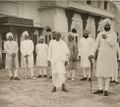Sardar Ballabh Bhai Patel
| Author:Laxman Burdak, IFS (R) |

Sardar Ballabh Bhai Patel, also popularly known as Sardar Patel (31 October 1875 – 15 December 1950) was one of the leaders of the Indian National Congress and founding fathers of the Republic of India. He was a social leader who played a leading role in the country's struggle for independence and guided its integration into a united, independent nation.
Freedom fighter
He was raised in the countryside of Gujarat. Vallabhbhai Patel was employed in successful practice as a lawyer. Patel subsequently organised peasants from Kheda, Borsad, and Bardoli in Gujarat in non-violent civil disobedience against oppressive policies imposed by the British Raj; in this role, he became one of the most influential leaders in Gujarat. He rose to the leadership of the Indian National Congress and was at the forefront of rebellions and political events, organising the party for elections in 1934 and 1937, and promoting the Quit India movement.
Iron man of India
As the first Home Minister and Deputy Prime Minister of India, Patel organised relief for refugees in Punjab and Delhi, and led efforts to restore peace across the nation. Patel took charge of the task to forge a united India from the British colonial provinces allocated to India and more than five hundred self-governing princely states, released from British suzerainty by the Indian Independence Act 1947. Using frank diplomacy, backed with the option and use of military force, Patel's leadership persuaded almost every princely state. Often known as the "Iron Man of India" or "Bismarck of India", he is also remembered as the "Patron Saint" of India's civil servants for establishing modern All India Services.
Biography
Sardar Vallabhbhai Patel was born in a Dudi Gotra Jat family of Gujarat.[1]
Arvind J Bosmia mentions that Sardar Patel's community is of Jat descent and they were brought to Gujarat as Jagirdars during Mughal rule. They claim the same status as the Jats of Bharatpur and Alwar, with Kshatriya pretensions.[2]
His native place was Karamsad. His date of birth was never officially recorded – Patel entered 31 October as his date of birth on his matriculation examination papers. They lived in the village of Karamsad, Bombay Presidency, where Jhaverbhai owned a homestead. Somabhai, Narsibhai and Vithalbhai Patel (also a future political leader) were his elder brothers. He had a younger brother, Kashibhai, and a sister, Dahiba. As a boy, Patel helped his father in the fields. When he was eighteen years old, Patel's marriage was arranged with Jhaverba, a girl of twelve or thirteen years old from a nearby village. According to custom, the young bride would continue to live with her parents until her husband started earning and could establish their household.
हवासिंह सांगवान [3] के अनुसार अंग्रेजी की पुस्तक 'सरदार बल्लभ भाई पटेल' में लिखा है कि गुजरात में सिद्धराज राजा का शासन था । वहां बार-बार खाद्य पदार्थों की कमी पर बारहवीं शताब्दी में दोआबा (उत्तर प्रदेश) से 1800 जाट किसान परिवारों को गुजरात के कर्मसाद क्षेत्र में छोटे-छोटे बारह गांव बनाकर तथा जमीन पट्टे पर देकर बसाया जिस पर ये जाट पट्टीदार से पटेल कहलाए और इन्हीं में से एक परिवार सरदार पटेल के पूर्वजों का था ।
External links
Gallery
-
Maharaja Yadavindra Singh of Patiala, Maharaja Ranbir Singh Of Jind, Maharaja Jagatjit Singh of Kapurthala Maharaja Pratap Singh of Nabha, Maharaja Sir Harinder Singh Brar of Faridkot with Sardar Vallabhai Patel
References
Back to The Freedom Fighters


